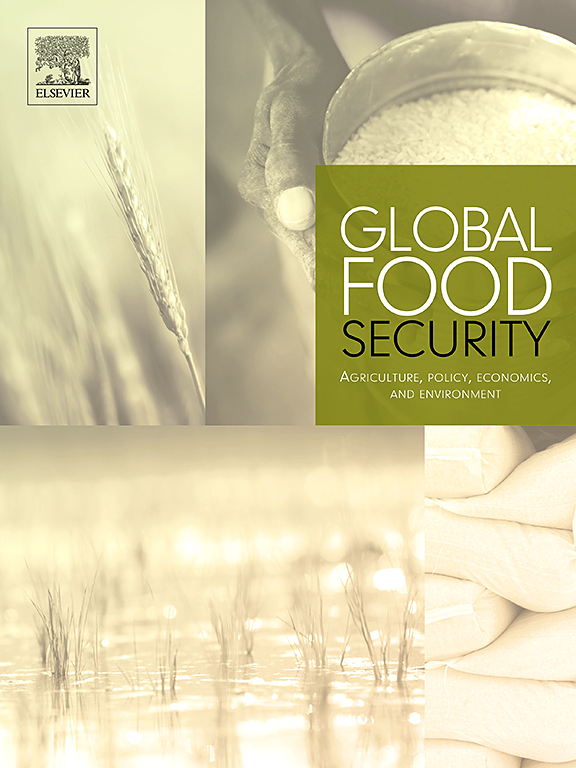平整农田:基于性别的产量差距决定因素的跨国研究
IF 9.6
1区 经济学
Q1 FOOD SCIENCE & TECHNOLOGY
Global Food Security-Agriculture Policy Economics and Environment
Pub Date : 2025-07-23
DOI:10.1016/j.gfs.2025.100873
引用次数: 0
摘要
在过去十年中,全球越来越关注女性农民在农业生产力方面落后于男性农民的问题。本研究回归到基于性别的农业生产力差异问题,分解了男性和女性农民之间的农业产量差异。我们确定了由属性和获得生产性资产的差异来解释的差距的一部分,以及由资产和属性的回报差异(即“无法解释的”差异)来解释的另一部分。本文利用来自亚洲、撒哈拉以南非洲和拉丁美洲的11个发展中国家的具有全国代表性的家庭调查,将Kitagawa-Oaxaca-Blinder分解应用于基于性别的生产率差距。我们利用一组可比较的解释性资产和属性来估计每个国家的生产率模型。我们还实现了对观察到的生产率差距的可比分解。跨国荟萃分析显示,观察到的性别生产率总差距并不总是有利于男性农民;然而,对这些差距的分析表明,女性农民普遍面临性别限制,表现为属性和资产的回报较低。本文章由计算机程序翻译,如有差异,请以英文原文为准。
Levelling the farm fields: A cross-country study of the determinants of gender-based yield gaps
Over the last decade there has been growing global attention to the problem of female farmers lagging in terms of agricultural productivity compared with male farmers. The present study returns to the question of gender-based differences in farm productivity, decomposing differences in farm yields between male and female farmers. We identify one part of the gap explained by differences in attributes and access to productive assets, and another part explained by differences in returns to assets and attributes (i.e. “unexplained” differences). This paper applies the Kitagawa-Oaxaca–Blinder decomposition to gender-based productivity gaps using nationally representative household surveys from 11 developing countries from Asia, sub-Saharan Africa and Latin America. We estimate productivity models for each country utilizing a comparable set of explanatory assets and attributes. We also implement a comparable decomposition of observed productivity gaps. The cross-country meta-analysis shows that observed total gaps in productivity by gender do not always favor male farmers; the decomposition of these gaps, however, reveals that female farmers generally face gender-specific constraints that manifest as lower returns to attributes and assets.
求助全文
通过发布文献求助,成功后即可免费获取论文全文。
去求助
来源期刊

Global Food Security-Agriculture Policy Economics and Environment
FOOD SCIENCE & TECHNOLOGY-
CiteScore
20.90
自引率
3.40%
发文量
69
期刊介绍:
Global Food Security plays a vital role in addressing food security challenges from local to global levels. To secure food systems, it emphasizes multifaceted actions considering technological, biophysical, institutional, economic, social, and political factors. The goal is to foster food systems that meet nutritional needs, preserve the environment, support livelihoods, tackle climate change, and diminish inequalities. This journal serves as a platform for researchers, policymakers, and practitioners to access and engage with recent, diverse research and perspectives on achieving sustainable food security globally. It aspires to be an internationally recognized resource presenting cutting-edge insights in an accessible manner to a broad audience.
 求助内容:
求助内容: 应助结果提醒方式:
应助结果提醒方式:


